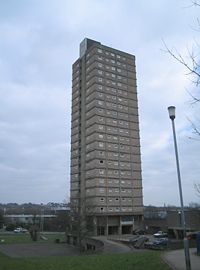
Back إسكان اجتماعي Arabic Sociální bydlení Czech Vivienda pública Spanish Sotsiaalmaja ET مسکن دولتی FA Logement social French דיור ציבורי HE Önkormányzati bérlakás Hungarian Perumahan umum ID Félagslegt húsnæði IS



Public housing, also known as social housing, refers to affordable housing provided in buildings that are usually owned and managed by local government, central government, nonprofit organizations or a combination thereof. The details, terminology, definitions of poverty, and other criteria for allocation may vary within different contexts, but the right to rent such a home is generally rationed through some form of means-testing or through administrative measures of housing needs.[2] One can regard social housing as a potential remedy for housing inequality. Within the OECD, social housing represents an average of 7% of national housing stock (2020), ranging from ~34% in the Netherlands to less than 1% in Colombia.[3][4]
In the United States, public housing developments are classified as housing projects that are owned by a housing authority or a low-income (project-based voucher) property. PBV are a component of a public housing agency. PBVs, administered by state and local housing agencies, are distinct from Section 8 Project-Based Rental Assistance (PBRA), a program through which property owners' contract directly with the Department of Housing and Urban Development (HUD) to rent units to families with low incomes.[5]
Affordable housing goals can also be achieved through subsidies. Subsidized housing is owned and operated by private owners who receive subsidies in exchange for providing affordable housing. Owners may be individual landlords or for-profit or nonprofit corporations.[6]
- ^ Hong Kong Housing Authority (31 March 2021). "香港房屋委員會年報 Hong Kong Housing Authority Annual Report" (PDF). housingauthority.gov.hk. Archived from the original (PDF) on 4 February 2022. Retrieved 4 February 2022.
- ^ Caves, R. W. (2004). Encyclopedia of the City. Routledge. pp. 610. ISBN 9780415252256.
- ^ "Public policies towards affordable housing". OECD. 2024. Retrieved 6 March 2024.
- ^ "PH4.2 Social rental dwellings stock" (PDF). OECD. 15 March 2022. Retrieved 6 March 2024.
- ^ https://www.cbpp.org/research/housing/project-based-vouchers
- ^ "Differences Between Public and Subsidized Housing - MassLegalHelp". Archived from the original on 6 October 2022. Retrieved 5 October 2022.